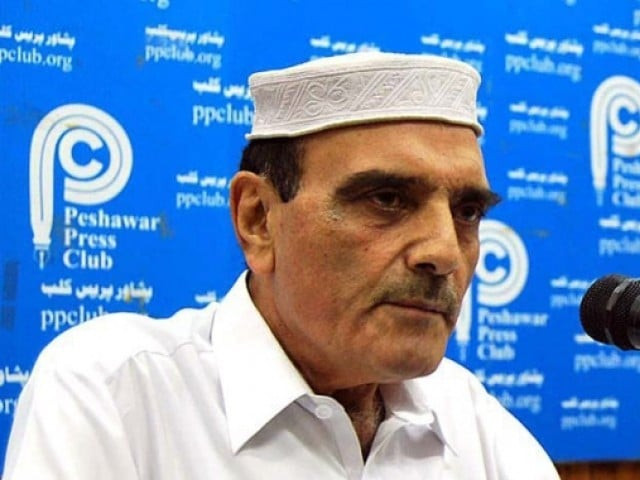The inimitable Azam Khan Hoti
Azam’s struggle brought the Hoti clan to the fore of Mardan’s political scene

The late Azam Khan Hoti PHOTO: File
Very few people are aware once he completed his education, Azam joined the army and was commissioned in 1967. He became a captain in the Pakistan Army Armoured Corps. Azam even participated in the 1971 Indo-Pak war and quit the service only after clashes between Pukhtun activists and the armed forces at Liaquat Bagh, Rawalpindi on March 23, 1973. A large number of young Pukhtuns are said to have lost their lives at Liaquat Bagh.
Like many others, Azam, unhappy with the injustices, left the country for Afghanistan and returned in 1979 only after military dictator Ziaul Haq announced general amnesty for Pukhtun leaders.
The late leader’s father, Amir Muhammad Khan, was a close aide of Khan Abdul Ghaffar Khan. Like Bacha Khan, Amir Muhammad Khan spent most of his life in and out of prison and involved in political action; first against the former British colonial rulers and then against the civil and military establishment which dominated Pakistan. This came at the cost of Azam’s father losing almost all his property, causing his family to also suffer.
The rise
But by then, Azam had not only become an army captain, he had made a successful debut in politics after he returned from his self-exile in Afghanistan. And no one was expecting Azam’s role in politics would give the family such a tremendous boost.
He was first elected to the National Assembly in 1990 and become a minister of state in the first government led by Nawaz Sharif. This was after he contested the 1988 general elections unsuccessfully. He remained a senator from 1993 till 1996 and had retained his NA seat in the 1997 polls. Azam served Nawaz’s second government as the minister for communication.
While many would rush to insist the famous motorway was the brainchild of the Pakistan Muslim League-Nawaz or the Sharif brothers, Azam was the one who floated the idea first as the minister of state for communication in 1992.
The power pivot
Without Azam Hoti and his family, the remaining two brand names associated with Awami National Party would find it difficult to land a win or make a true comeback into parliamentary politics. The only other exceptions of multiple successes are the late Khan Mir Afzal Khan and late Nawabzada Ghafoor Khan who held more than one political office.
Azam and his son Amir Haider have held several powerful positions. And after the death of Khan Abdul Wali Khan in early 2007, Azam was one of the pivots which swung popular success towards the way of the ANP, eventually making it a ruling party in the 2008 general polls.
The last few years of his life were marred by family disputes; rifts with his children and even with Begum Naseem Wali, his sister and the late Wali Khan’s wife. His demise will most surely weaken his family’s influence which faces strong rivals in Mardan and even the party. After the impact of religious extremism on the ability of ANP to even campaign in 2013, the death of someone as powerful as Azam Hoti trumpets an end of an era of astute political acumen within the Hoti clan and the party.













COMMENTS
Comments are moderated and generally will be posted if they are on-topic and not abusive.
For more information, please see our Comments FAQ